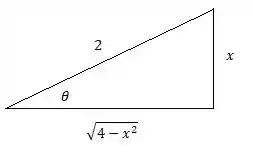Calcule a integral indefinida:
Passo 1
Para resolver essa integral vamos fazer uma substituição trigonométrica, temos que a expressão é da forma , nesse formato de expressão vamos fazer e utilizar a identidade trigonométrica :
Substituindo temos:
Agora usando a identidade trigonométrica:
Passo 2
Para calcular a segunda integral vamos usar a fórmula da Recorrência:
Aplicando vamos ter:
Passo 3
Agora é fácil achar as primitivas da função, usando as expressões da Tabela de Integrais Indefinidas:
Agora é só aplicar:
Passo 4
Agora é só juntar tudo:
Passo 5
Calma, não terminou ainda, vamos ter que voltar para a variável original , temos que , ou seja, , assim vamos usar o triângulo retângulo abaixo para achar e :

Assim:
Passo 6
Pronto, agora é só substituir e ficamos então com: